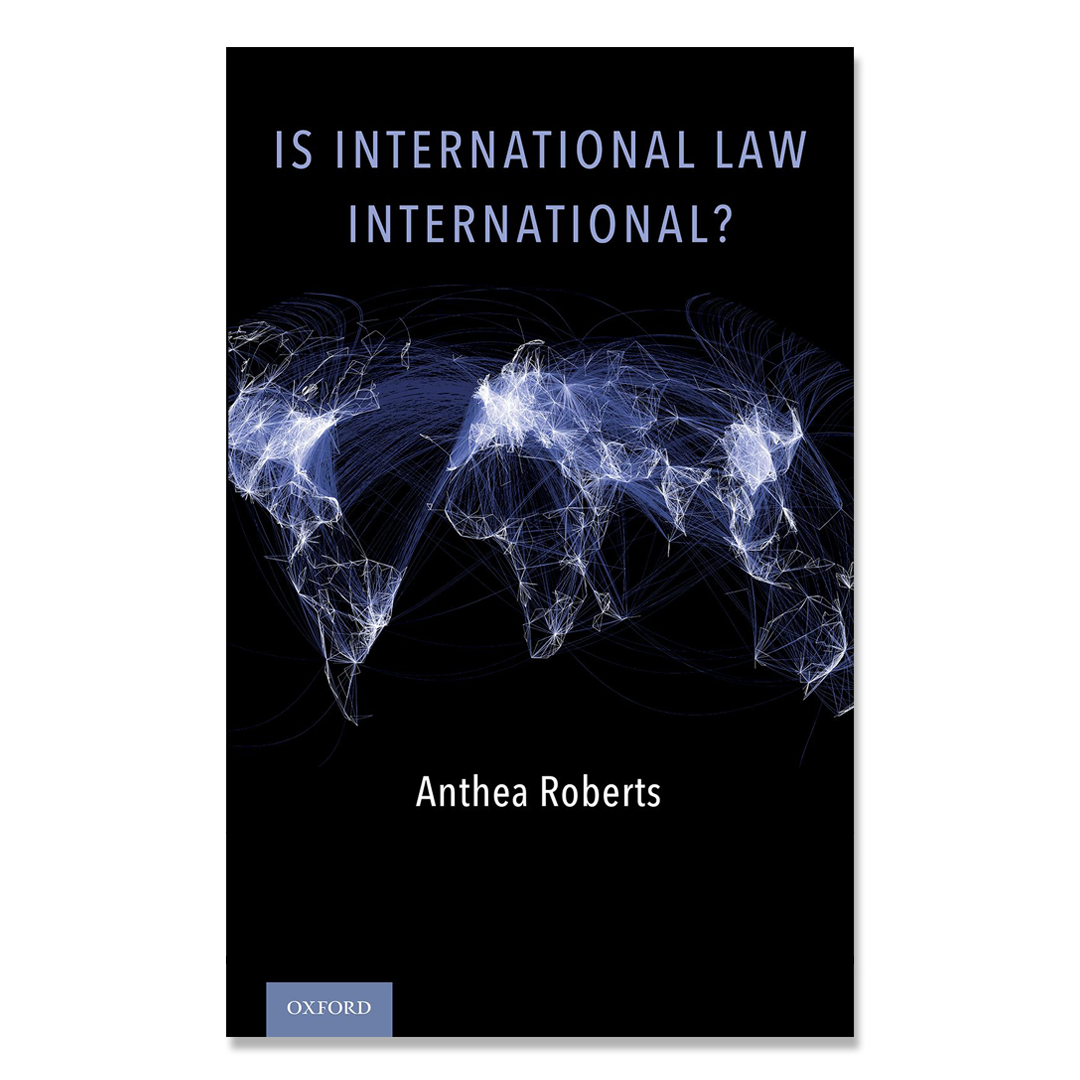Is International Law International?
Anthea Roberts
Oxford University Press, 2017
Winner, ASIL Certificate of Merit for Preeminent Contribution to Creative Scholarship 2018

“[N]othing in the field will be quite the same after this book has been published. It is such an eye-opener.”
– Martti Koskenniemi, Director, Erik Castrén Institute of International law and Human Rights
“Roberts has written a masterpiece.”
– Samuel Moyn, Professor of Law, Yale Law School
Description
This broad exploration of the international legal field reveals the patterns of difference, dominance, and disruption that belie international law's claim to universality. Pulling back the curtain on the “divisible college of international lawyers,” Anthea Roberts shows how international lawyers in different states, regions, and geopolitical groupings are often subject to distinct incoming influences and outgoing spheres of influence in ways that reflect and reinforce differences in how they understand and approach international law. These divisions manifest themselves in contemporary controversies, such as debates about Crimea and the South China Sea.
Not all approaches to international law are created equal, however. Using case studies and visual representations, Anthea demonstrates how actors and materials from some states and groups have come to dominate certain transnational flows and forums in ways that make them disproportionately influential in constructing the “international.” This point holds true for Western actors, materials, and approaches in general, and for Anglo-American (and sometimes French) ones in particular.
However, these patterns are set for disruption. As the world moves past an era of Western dominance and toward greater multipolarity, it is imperative for international lawyers to understand the perspectives and approaches of those coming from diverse backgrounds. By taking readers on a comparative tour of different international law academies and textbooks, the author encourages them to see the world through the eyes of others – an essential skill in this fast-changing world of shifting power dynamics and rising nationalism.
Awards
• Winner, ASIL 2018 Certificate of Merit for a Preeminent Contribution to Creative Scholarship
• Shortlisted, 2019 Hart-SLSA Book Prize
• Longlisted, CHASS (Council for the Humanities, Arts, and Social Sciences) Australia Book Prize
• Honorable Mention, International Studies Association's Best International Law Book Award
• Ranked 2nd, Best International Law Books of All Time, Book Authority, 2021
Review highlights
“I enjoyed reading this book tremendously and have kept coming back to the staggering view of the international law world it offers over again. I am very serious when I say that nothing in the field will be quite the same after this book has been published. It is such an eye-opener.”
– Martti Koskenniemi, Professor of International Law (University of Helsinki), and Director, Erik Castrén Institute of International law and Human Rights
“Instantly, it is a classic that anyone who wants to reflect on the field must read. The central virtue of Professor Roberts’s study is that it is brilliantly and rigorously empirical, based on an extraordinary survey of how training, scholarship, and service in international law actually take place across the world. Both hard-bitten realists about the endurance of international struggle and idealists who hope for a more unified humanity must now start with Professor Roberts’s book.”
– Sam Moyn, Lawfare
“Roberts’ Is International Law International? has succeeded in becoming a standard book every lawyer needs to bear in mind whenever he or she contemplates about the different views held by academics in other countries or regions. It deserves its rank next to the international law-must-reads such as Martti Koskenniemi’s From Apology to Utopia or Rosalyn Higgins’ Problems and Process.”
– Ralph Janik, Austrian Review of International and European Law
“[T]his work should be followed by others building on its impressive methodological framework and the wealth of collected data. Roberts´s contribution to the establishment of comparative international law is a major one and no matter how unsettling this could be for some, it will be difficult to look at international law the same way after the publication of her work.”
– Josef Ostřanský, Leiden Journal of International Law
“Roberts… has raised an extremely profound question concerning the universality, purity, and globalized aspiration/aspects of international law… in order to answer it she has not only considered several of the key stakeholders of international law but also geopolitical influences on the law... This sociological inquiry makes her study pragmatic, thought-provoking, and intellectually intriguing.”
– Vijay Kumar, K D Raju and S R Subramanian, Asian Journal of International Law
“[T]he book raises challenging questions that go deep to issues, such as the source of international law’s authority and the structure of the international order. Roberts crafts a powerful account challenging the assumed universality of international law… Roberts’s book has the potential of altering the teaching of international law as well as the perception of the field as a whole.”
– Stavros-Evdokimos Pantazopoulos, Questions of International Law
“Occasionally a book appears which has a significant impact on the scholarly community…Dr. Roberts deserves congratulation for what is an extremely important book. It is hard being a pioneer (not least charting the direction of future study in a sub-field). It is even harder to gain mastery of a range of matters (including in the social sciences) largely overlooked by international lawyers, to date.”
– D K Labin and T Potier, Moscow Journal of International Law
“In her masterful work, Is International Law International?, Anthea Roberts convincingly shatters our illusions about international law’s universality, and makes the case for comparison in international law… I argue that it would be a great loss if we did not take her up on this challenge.”
– Katerina Linos, American Journal of International Law
“Roberts’ monograph represents … an imaginative, heterodox work that challenges the very foundations of our profession. Her overriding purpose is to deny that any international lawyer can understand all aspects of the field from all viewpoints …. All of these assertions, when justified as carefully and modestly as she has done, merit careful reflection from all of us.”
– Gleider Hernández, The European Journal of International Law
“This provocative and yet very simple question unleashes a disruptive conceptual earthquake: what if that right that we consider universal par excellence was not international at all? Although the answers to these provocations might seem obvious, their implications are far from being predictable – if only we take them seriously into account as Anthea Roberts does.”
– Francesca Iurlaro, Guerra e Diritto Internazionale
“Anthea Roberts’s Is International Law International? is definitely groundbreaking and also an instant best-seller. In a world where different understandings of international law would probably always exist, the comparative international law approach is indeed essential for facilitating enhanced communication and cooperation among different States, by which ‘harmony without uniformity’ in international law could be realized.”
– Lu Zhu, Chinese Journal of International Law
“Roberts’ work is essential reading for any international lawyer and, indeed, for anyone interested in better understanding international law.’
– Kevin Crow, Journal of International Economic Law
“There is so much to be commended about this book. It reads almost like a novel, such is its engaging style and wealth of information and insights into the collective minds of international legal communities.”
– Alessandra Asteriti, Italian Yearbook of International Law
“In what has already become an instant and award-winning classic of the international legal canon, Anthea Roberts’ Is International Law International? provides a welcome insight into how international law is approached across domestic contexts – a process she identifies as ‘comparative international law.’ ... Rather than asking that age old question: Is international law, law?, she considers instead: Is international law international? In doing so, she issues a powerful counterclaim to international law's appeal to both universality and to neutrality.”
– Miriam Bak McKenna, Nordic Journal of International Law
“Roberts’s new book, marshals an extensive body of original research to suggest that there are significant cross-national variations in the ideological and doctrinal content of international legal education. The [book’s] implications are far-reaching, and I truly view the book as required reading for anyone interested in international law.”
– Ryan Scoville, Lawfare
More reviews
• (2019) 16 ICONnect 4 (blog of ICON), Colm O’Cinneide
• (2018) 58 Indian Journal of International Law 517–520, Madhav Mallya
• (2018) 81 The Journal of Politics 1, Leslie Johns
• (2018) Revue Critique de Droit International Prive, T. Marzal
• (2018) 19 Melbourne Journal of International Law 413-422, Andrea Leiter
• (2018) 70/2 Spanish Journal of International Law 285-286 (in Spanish)
• (2018) 81 The Modern Law Review 547–551, Ryan Mitchell
• (2018) 7 Cambridge International Law Journal, Orfeas Chasapis Tassinis
• (2018) Yale Journal of International Law, Beatrice Walton
• (2018) 1 Eurasia: Rivista di studi geopolitici
• (2018) Australian Yearbook of International Law, Dae Un Hong
• (2018) “Is International Law International? Exploring its Normative Underpinnings” 6 Questions of International Law 54, 5-19, Stavros Pantazopolous
• (2017) 3 Storia del pensiero politico 3
Videos
Harvard Law School Library Book Talk, “Is International Law International?”
ASIL Annual Meeting Panel on “Legal Education and Professional Training in the Culture(s) of International Law”
UN Audiovisual Library Lecture, “Is International Law International?”
A Brazilian Reaction to “Is International Law International?”
Interview at the Australian Institute of International Affairs
London School of Economics Book Talk, “Is International Law International?”
Symposia
Boston University Law Review Online, 2019
Contributors
Neha Jain, The Many Inequalities of International Law
Jan Klabbers, The Roberts Challenge
Pamela K. Bookman, Is Private International Law International Law?
Rebecca Ingber, If International Law Is Not International, What Comes Next?
Ralf Michaels, Beyond Universalism and Particularism in International Law—Insights from Comparative Law and Private International Law
William W. Park, Unity and Diversity in International Law
Anthea Roberts, Reflections on Is International Law International?
Opinio Juris and EJIL: Talk! Joint Symposium, 2018
Contributors
Julian Ku, Is International Law … Law?
Marko Milanovic, Mobility and Freedom in the International Legal Academy
Hélène Ruiz Fabri, From Babel to Esperanto and Back Again: The Fate of International Law (or International Lawyers?)
Paul Stephan, On Is International Law International? – Where Next?
Vera Rusinova, Can International Law be More International?
Anthea Roberts, Is International Law International? Continuing the Conversation
Questions of International Law (online), 2018
Contributors
Laura Vagni, The relationship between Human Rights and Property and the need for comparison in International Law
Ermanno Calzolaio, Comparative law and international law: inevitable liaisons?
Andrea Carcano, Uses and possible misuses of a Comparative International Law approach
Stavros-Evdokimos Pantazopoulos, Is International Law International? Exploring its normative underpinnings




